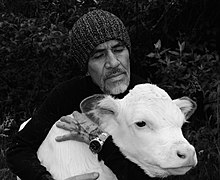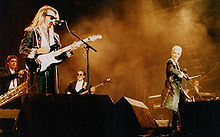Chucho Merchán
Chucho Merchán | |
|---|---|
 | |
| Background information | |
| Birth name | Jesús Alfredo Merchán |
| Born | 24 December 1952 Bogotá, Colombia |
| Genres | |
| Occupation(s) | Musician, activist |
| Instrument | Double bass |
| Years active | 1971–present |
| Website | chuchomerchan |


Jesús Alfredo Merchán (born December 24, 1952)[1]), known professionally as Chucho Merchán, is a session jazz and rock bassist[2] and guitarist. He received a Bachelor of Arts degree from Cambridge University in 1980. He has performed with Nucleus, Eurythmics, The Pretenders, Thomas Dolby, George Harrison, Pete Townshend, David Gilmour, Robi Rosa, Bryan Adams, Kirsty MacColl, Jaguares, and Everything but the Girl.
His first musical experiences were in South America with his band Malanga and with university bands in California. In 1974 he traveled to England to study music at the Cambridge University. He studied composition, orchestration, direction and orchestral conduction, guitar, piano, percussion, and double bass. In 1980 he received his Bachelor of Arts. In the same year, after his graduation, he began to play double bass. His band Macondo, which he founded and for which he composes, won the prize for the best European jazz band. With this band he played at jazz festivals in Montreaux and Newport. In Cambridge he received the prize for composition with his string quartet Vientos del Sur. In 1983 he joined the Thomas Dolby band as a guitarist and went on his first world tour promoting the album The Flat Earth.
In 1986 he joined the band The Pretenders with whom he recorded the album Get Close. After the eruption of the Nevado del Ruiz volcano, which destroyed Armero and left 25,000 people dead, Chucho organized a charity concert for the survivors. David Gilmour, Annie Lennox, Pete Townshend, and Mike Oldfield participated in this event.
With the funds acquired, charity works were done in Colombia, including a school, a sports center, and a brick factory. This is when FONEVA was born, a charity which he manages and which helps children, elderly people, and animals in Colombia.[3]
He conducted The London Philharmonic Orchestra for Pete Townsend's album Iron Man and recorded the bass in Scoop, White City and Deep End Live and was the musical director on the tour of The Who which celebrated their 25th anniversary. In 1986 he joined Eurythmics[4] on the albums Revenge, We Too Are One and Peace, and toured with the band. He worked with Annie Lennox[5] on her album Diva and on Red Hot and Blue to help victims of AIDS. With Eurythmics, he participated in the concert at Wembley Stadium to push the South African government to release Nelson Mandela.[6] He also collaborated with Eurythmics member Dave Stewart on several tracks for the Lily Was Here soundtrack, released in 1989.
Discography
- De regreso a casa. Independent, 2007
- Es ahora o nunca. Independent, 2009
- Mundo al reves. Independent, 2011
- Revolución de conciencia. Independent, 2013
- El pueblo unido. Independent, 2015
- El poder sagrado de la vida. Independent, 2017
- Vystopía. Independent, 2018
References
- ^ "Chucho Merchán, el sonido de Macondo" [Chucho Merchán, the sound of Macondo]. El Tiempo (in Spanish). August 28, 1992. Retrieved May 27, 2012.
- ^ "Chucho Merchan". Know Your Bass Player. Retrieved 2018-08-23.
- ^ Radio, Caracol. "Chucho Merchán el rockero animalista". Caracol Radio (in Spanish). Retrieved 2018-08-20.
- ^ FM, La (2018-05-03). "Chucho Merchán, el músico que colaboró Eurythmics y Pink Floyd, habló con Los Originales" (in Spanish). Retrieved 2018-08-20.
- ^ Ellis, Lucy (2009-12-16). Annie Lennox: The Biography. Omnibus Press. ISBN 9780857121141.
- ^ Tiempo, Casa Editorial El (2016-09-01). "La leyenda del rock nacional que se 'codeó' con The Who y Eurythmics". El Tiempo (in Spanish). Retrieved 2018-08-20.
